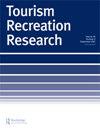Free time as a central issue of tourism studies: a genealogy of leisure/idleness based on the indigenous cosmovisions of Latin America
IF 2.6
Q1 HOSPITALITY, LEISURE, SPORT & TOURISM
引用次数: 1
Abstract
ABSTRACT The dominance of the neoliberal ideology over tourism praxis in the last decades have undermined the possibilities for tourism to be seen as a social transformative force. This article considers that the richest part of the tourist experience belongs to the realm of ‘free time’. There is evidence of the importance of free time and leisure in indigenous societies, and to justify that the common-sense view of leisure activities should be confronted. Most literature on indigenous voices in tourism studies identifies the potential of indigenous ideas to contribute to Western/European values of resilience, sustainability and environmental justice. However, such values are employed in the name of modernization and neoliberalism which are taken for granted as values of civilization, but are not so in reality. Thus, this article explores anthropological and indigenous bibliographic productions from Latin America and interviews with indigenous people located in Northeast Brazil to produce a genealogy of leisure, based on 'cultural anthropophagy'. Violence, racism and fear emerged as structural elements of the Western development choice. Tourism studies could further examine leisure as a means to inform contemporary development policies and contribute toward a better life in society, relatively free from such structural ills.作为旅游研究中心问题的空闲时间:基于拉丁美洲本土世界观的休闲/闲散谱系
在过去的几十年里,新自由主义意识形态在旅游实践中的主导地位削弱了旅游业被视为一种社会变革力量的可能性。本文认为,旅游体验中最丰富的部分属于“自由时间”的范畴。有证据表明自由时间和休闲在土著社会中的重要性,并证明应该面对休闲活动的常识性观点。大多数关于旅游研究中土著声音的文献都确定了土著思想对西方/欧洲恢复力、可持续性和环境正义价值观的贡献潜力。然而,这些价值观是以现代化和新自由主义的名义被利用的,这些价值观被视为理所当然的文明价值观,但实际上并非如此。因此,本文探讨了来自拉丁美洲的人类学和土著文献作品,并采访了位于巴西东北部的土著居民,以“文化食人”为基础,制作了一个休闲谱系。暴力、种族主义和恐惧成为西方发展选择的结构性因素。旅游研究可以进一步研究休闲作为一种手段,为当代发展政策提供信息,并有助于在相对没有这种结构性弊病的情况下改善社会生活。
本文章由计算机程序翻译,如有差异,请以英文原文为准。
求助全文
约1分钟内获得全文
求助全文
来源期刊

Tourism Recreation Research
HOSPITALITY, LEISURE, SPORT & TOURISM-
CiteScore
11.30
自引率
7.10%
发文量
77
期刊介绍:
Tourism Recreation Research is a multidisciplinary international journal now published quarterly; it focuses on research problems in various tourism and recreational environments — ecological, economic, and socio-cultural — and attempts to seek solutions for sustainable development. Contributions are also encouraged on fundamental research concepts and theories. The journal carries regular features such as Research Note, Post-Published Reviews and Book Reviews. The ‘Research Note’ provides opportunity for scholars who have attained sufficient maturity to establish reliable findings in their field of research. The ‘Post-Published Review’ section has been introduced to capture deep insights into the papers that have already been published in Tourism Recreation Research to fill in gaps in the received information. Strong emphasis is laid on original research and readable prose.
 求助内容:
求助内容: 应助结果提醒方式:
应助结果提醒方式:


